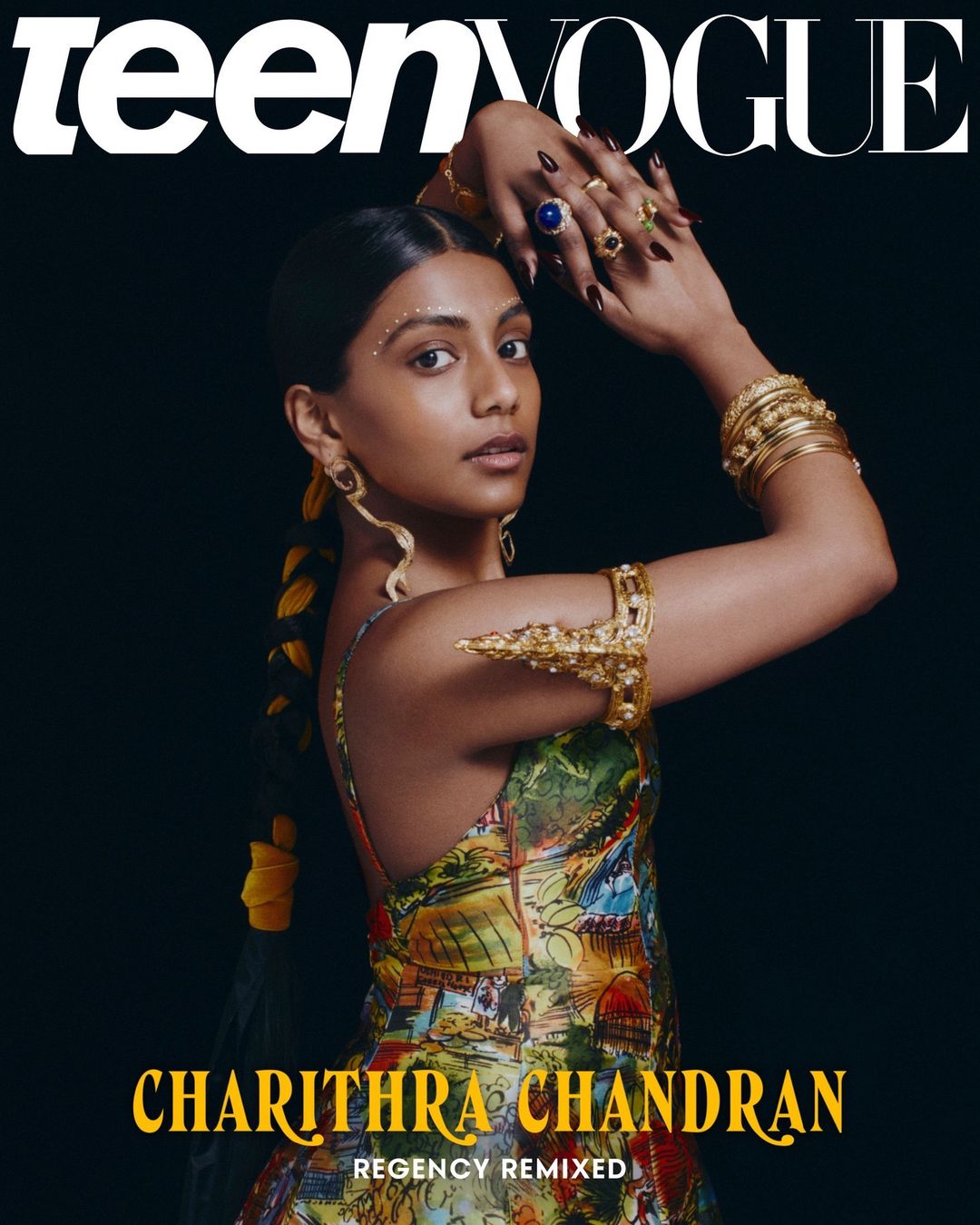It’s amazing to me, an Indian-American woman in my 40s, to see how many Desi women there are in Hollywood/entertainment these days. When I was growing up, this was not the case. But Desi girls are getting so much more representation these days and it’s wonderful. Bridgerton’s Season 2 is a revelation for that, for putting two British Indian women in the lead roles. Charithra Chandran, 25, plays the younger Sharma sister, Edwina, the “diamond” of the social season. She’s so beautiful and her styling on the show was gorgeous. Charithra covers the latest issue of Teen Vogue, and she discussed colorism, Bridgerton, Desi culture and a lot more. Some highlights:
On Bridgerton including the haldi ceremony before the wedding: “I was so taken with the depiction of the whole ceremony. We have literally never seen that in a show like Bridgerton or in this kind of era, and it’s just so amazing and deeply personal.”
She’s not saying that marriage should be anyone’s top priority: “I know that many young Indian women are brought up with the idea that their priority is to be a wife and a mother and a sister and a daughter. And so for me, Edwina was incredibly personal because I could see a lot of people that looked like her in that position. And if they can get anything from this season, it’s that you are much more in control of your own life than you imagine. And even at the moment when you think it’s too late, even on your wedding day, you can still take control. And that doesn’t necessarily mean you know where you’re going to be in five years time or that you have to have a fleshed out plan, sometimes you just have to believe in yourself and take a risk on yourself, and you know, all else is limitless.”
Her immigrant parents accept but do not love the fact that their daughter is an actress: “I was always sort of naturally academic. It wasn’t that they were supportive or not supportive [of acting at a young age], they didn’t care or mind — [theater] was something I loved, it didn’t affect my academics… They’re happy that I’m happy and they’re proud of what I achieved. Are they happy about my career choice? Truthfully, no… And I wouldn’t expect them to be. That doesn’t mean they’re not good parents, that doesn’t mean they’re not supportive.”
Existing as a dark-skinned Indian woman: “For me, colorism in some ways is more painful because it feels like a betrayal of your own. If someone’s racist to you, you have your community to lean back on… But if someone’s attacking you from inside your own family, or trying to oppress you, or create a hierarchy within your own family, that is in some ways, so much harder to deal with.”
She was reminded of her skin color from an early age: “No one let me forget that I was dark-skinned growing up. My grandma was very light-skinned. Whenever we’d go around in India, they’d always say, ‘Oh, you’d be pretty if you had your grandmother’s coloring.’ ‘Shame about the color of her skin.’ ‘She’s pretty for being dark-skinned.’ All of these comments, all the time. My grandparents — I don’t hold this against them at all, they were trying to make my life easier — I wouldn’t be allowed to play outside. I’d have to play early in the morning or in the evening [to avoid the sun].”
She never used the skin-lightening products: She’s never used the skin lightening cream Fair and Lovely (which is ubiquitous in India, and can even be found in Indian grocery stores in the U.S. and UK), but has been exposed to similar “natural” products — “and they always hide it under like, ‘it makes you glow,’ ‘brightens’ — it’s all synonyms for lighter. So I never, ever was able to forget that I was darker-skinned…. When the sun is shining and I tan, my instinct is like, ‘oh f*ck, I tanned.’ I’m trying to unlearn it. It’s going to be a lifelong struggle. Or like when I’m editing a photo for Instagram, of course the temptations are there, because for most of my life I’ve been taught that that’s what is beautiful. It’s really, really traumatizing. I just desperately don’t want that for my cousins. I just pray, pray, pray that it’s not like that for them.”
She wants more Desi stories: “It’s this idea of ‘we have to be excellent.’ Mediocrity will just not pass. Like, if this doesn’t succeed, we may be sabotaging so many opportunities for other Indians. Which is not true, but that’s the way I think about it in my head. So for me, the most important opinions are from the Indian diaspora and audiences in India — I just so desperately want them to love it. My biggest concern is that they don’t… In particular, what I love are how Desi people feel like we’re breaking stereotypes. The stereotype that Indians are nerdy and insecure, shy or whatever is not at all what Kate and Edwina represent. We’re expanding people’s knowledge of not only our culture but also of our people.”
[From Teen Vogue]
She’s dead-on about the colorism within families – I didn’t understand, when I was little, why my Indian relatives praised me for being “fair” or openly talking about my coloring. It was bizarre to me. And she’s right about the immigrant parents thing too – her parents are probably vaguely supportive but terrified that their daughter won’t make money, won’t be able to support herself and won’t have many career prospects (or marriage prospects). Anyway, she seems beautiful, cool and brilliant. I stan.
https://www.instagram.com/p/Cb-b85wlxLD/
Cover & IG courtesy of Teen Vogue.
Source: Read Full Article


